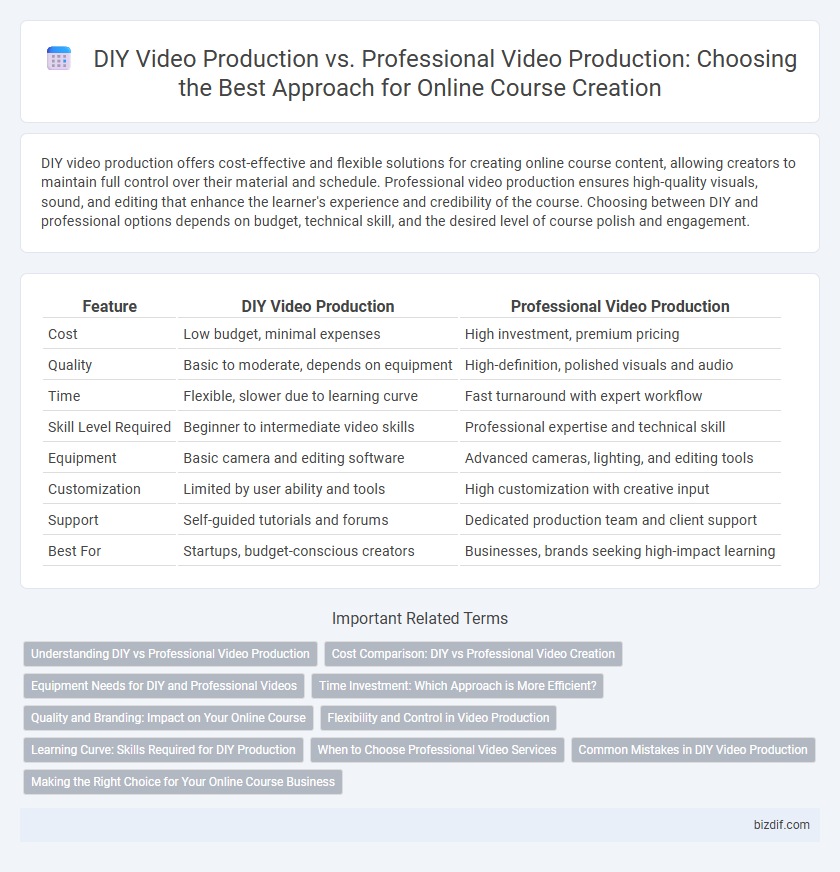DIY video production offers cost-effective and flexible solutions for creating online course content, allowing creators to maintain full control over their material and schedule. Professional video production ensures high-quality visuals, sound, and editing that enhance the learner's experience and credibility of the course. Choosing between DIY and professional options depends on budget, technical skill, and the desired level of course polish and engagement.
Table of Comparison
| Feature | DIY Video Production | Professional Video Production |
|---|---|---|
| Cost | Low budget, minimal expenses | High investment, premium pricing |
| Quality | Basic to moderate, depends on equipment | High-definition, polished visuals and audio |
| Time | Flexible, slower due to learning curve | Fast turnaround with expert workflow |
| Skill Level Required | Beginner to intermediate video skills | Professional expertise and technical skill |
| Equipment | Basic camera and editing software | Advanced cameras, lighting, and editing tools |
| Customization | Limited by user ability and tools | High customization with creative input |
| Support | Self-guided tutorials and forums | Dedicated production team and client support |
| Best For | Startups, budget-conscious creators | Businesses, brands seeking high-impact learning |
Understanding DIY vs Professional Video Production
DIY video production offers course creators cost-effective control over content creation, enabling quick edits and personalized storytelling using affordable equipment and basic software. Professional video production delivers high-quality visuals, advanced editing, and polished sound design through expert teams and specialized gear, resulting in a more engaging and credible learning experience. Balancing budget constraints with desired video quality is key for online educators aiming to maximize student retention and course value.
Cost Comparison: DIY vs Professional Video Creation
DIY video production for online courses typically costs between $100 to $1,000, covering basic equipment like a camera, lighting, and editing software, while professional video production ranges from $3,000 to $20,000 or more per course depending on quality and scope. Investing in DIY options minimizes upfront expenses but may require significant time and learning to achieve acceptable results; professional services include expertise, high-end equipment, and post-production but represent a higher financial commitment. Evaluating budget constraints and desired production quality helps determine the most cost-effective approach for course creators.
Equipment Needs for DIY and Professional Videos
DIY video production for online courses typically requires basic equipment such as a high-quality smartphone or DSLR camera, a tripod, external microphone, and affordable lighting kits to ensure clear visuals and audio. Professional video production utilizes advanced cameras like cinema-grade models, specialized lenses, professional-grade lighting setups, and high-fidelity audio recording gear that enhance production value and viewer engagement. Investing in professional equipment significantly improves video quality but requires higher budget and technical expertise compared to DIY setups.
Time Investment: Which Approach is More Efficient?
DIY video production typically requires a significant time investment for scripting, recording, and editing, often extending project timelines due to the learning curve involved. Professional video production streamlines these processes with expert teams and high-end equipment, reducing turnaround time and ensuring consistent quality. Efficient time management in online course creation often leans towards professional services when deadlines and production quality are critical.
Quality and Branding: Impact on Your Online Course
DIY video production offers cost-effective control but may compromise video quality, affecting viewer engagement and perceived course value. Professional video production delivers high-quality visuals and sound, enhancing brand credibility and creating a polished learning experience. Investing in expert video services often results in stronger student trust and higher course completion rates.
Flexibility and Control in Video Production
DIY video production offers maximum flexibility and control, allowing creators to tailor every aspect of content from scripting to editing at their own pace. Professional video production delivers high-quality results with expert teams managing technical details, though it may limit hands-on involvement and require adherence to stricter schedules. Choosing between DIY and professional approaches depends on the creator's priorities for creative control, budget, and timeline.
Learning Curve: Skills Required for DIY Production
DIY video production demands a steep learning curve as creators must master camera techniques, lighting, sound recording, and editing software to produce high-quality content. Developing these skills often requires extensive trial and error, which can delay course delivery and affect the overall production value. In contrast, professional video production leverages experienced crews and advanced equipment, minimizing skill gaps and ensuring polished final results.
When to Choose Professional Video Services
Choosing professional video production services is essential when creating high-quality online courses that demand polished visuals, clear audio, and expert editing to engage and retain learners. Complex course content, brand consistency, and the need for custom animations or special effects are best handled by experts with specialized equipment and creative skills. Investing in professional production enhances course credibility and can significantly boost student enrollment and satisfaction rates.
Common Mistakes in DIY Video Production
Common mistakes in DIY video production include poor lighting, inconsistent audio quality, and shaky camera work, which can detract from the overall professionalism of an online course. Neglecting proper script planning and editing often results in disorganized content that reduces learner engagement. Investing in basic equipment and learning key production techniques can significantly improve video quality without the need for costly professional services.
Making the Right Choice for Your Online Course Business
Choosing between DIY video production and professional services depends largely on your budget, technical skills, and course goals. DIY video production offers cost-efficiency and creative control, while professional video production ensures high-quality visuals and polished editing that can enhance learner engagement and course credibility. Evaluating your target audience's expectations and the competitive landscape of your online course market will help you make the right choice for your online course business growth.
DIY Video Production vs Professional Video Production Infographic

 bizdif.com
bizdif.com